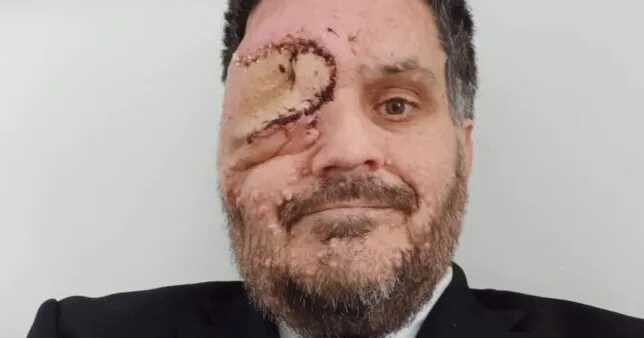Man asked to leave restaurant after complaints that his face was frightening customers

A man with a facial disfigurement says he was asked to leave a restaurant because he was ‘scaring customers’.
Oliver Bromley, 42, was receiving treatment at King’s College Hospital in Camberwell, southeast London, when he decided to try a local eatery for lunch.
But when he went to order food, a member of staff said they had had complaints from customers about his face and asked him to leave.
Oliver has a genetic condition called Neurofibromatosis Type 1 – which causes benign, non-cancerous tumours to grow on his nerves.
Upset and shocked by the experience, Oliver wrote to the restaurant but said he received no response.
He is now sharing his story in the hope that it will educate people about his condition and prevent similar situations in the future for him and others.
He has been in contact with charity Nerve Tumours UK, who said what Oliver experienced is sadly ‘not uncommon’.
It has organised meetings with UKHospitality to call for more awareness in the hospitality industry.
Oliver, who helps run an NHS mental health crisis helpline but is currently off work, said he had been undergoing treatment at King’s College Hospital last month when he decided to ‘take myself for lunch’.
‘The food looked good when I looked in one window, and I went inside,’ he explained.
‘They said they were cash only, so I took some money out and went to place my order.
‘The gentleman behind the counter told me there had been complaints about me, and for me to please leave.
‘I asked him to repeat himself, and he said I was scaring customers.”
Oliver, who lives in Reigate, Surrey, said he was ‘incredulous’ at what the employee told him, as he had hardly been in the restaurant long enough for someone to complain about his presence.
‘I hadn’t even sat down,’ he continued. ‘I went to place my order and they asked me to leave.
‘Perhaps they had seen me browsing, perhaps they didn’t want me in there.
‘I don’t know, but that is what they said. These are the facts.
‘Obviously, I was very upset. I went to a local park to console myself and think of a plan of action on how to deal with it.’
After writing to the restaurant, which he doesn’t want to name, and not receiving a response, Oliver contacted the Met Police, who recorded the incident as a hate crime.
The Met confirmed to the BBC that officers had visited Oliver about the incident and said that although no arrests had been made, the force took ‘reports of hate crime seriously’.
Oliver it was the first time he’s been asked to leave an somewhere.
‘People stare – young children, especially – but I’ve never been treated as directly as that,’ he said.

He hopes by sharing his experience it will educate people about his condition (Picture: Oliver Bromley/SWNS)
‘It was very direct and very clear that I was not wanted.
‘At the time of the incident, the country was in the midst of racial riots.
‘I was able to feel what it’s like to be discriminated against.’
Nerve Tumours UK director, Karen Cockburn, said: ‘We were extremely disappointed to hear news of the dreadful, but sadly not uncommon, incident that Oliver Bromley experienced whilst attempting to purchase lunch.
‘We work tirelessly to raise both the profile of the condition and the work that we do to help patients; and also to educate the wider public about the condition.
‘If Oliver felt that he had been discriminated against, there is the option that he could have a case under the 2010 Equalities Act, in which ‘severe disfigurement’ is a protected characteristic.
‘We have written to both the restaurant concerned, and to UKHospitality, the trade association body.
‘Whilst we have not received any response from the restaurant, I am delighted to say that UKHospitality has offered to work with us to raise awareness of the condition amongst the hospitality sector, and I am meeting with them shortly to kick start this joint venture.’
Oliver hopes his distressing experience will have a positive influence and insists he’s not seeking ‘retribution’.
‘All [the restaurant] needed to do was ask,’ he said. ‘There’s a lot of naivety around the issue.
‘I am on a mission to spread awareness about my condition.
‘I would really like to educate the hospitality industry about what it is.
‘There is nothing to be afraid of, it’s just something some individuals have to live with.
‘I am hoping this raises awareness and that, going forward, there might be a positive outcome and prevent it happening again.
‘There’s always going to be nasty people in the world, but that’s my hope.’
Trading Standards have also been told of his experience.
Read more similar news:
Comments:
comments powered by Disqus

































